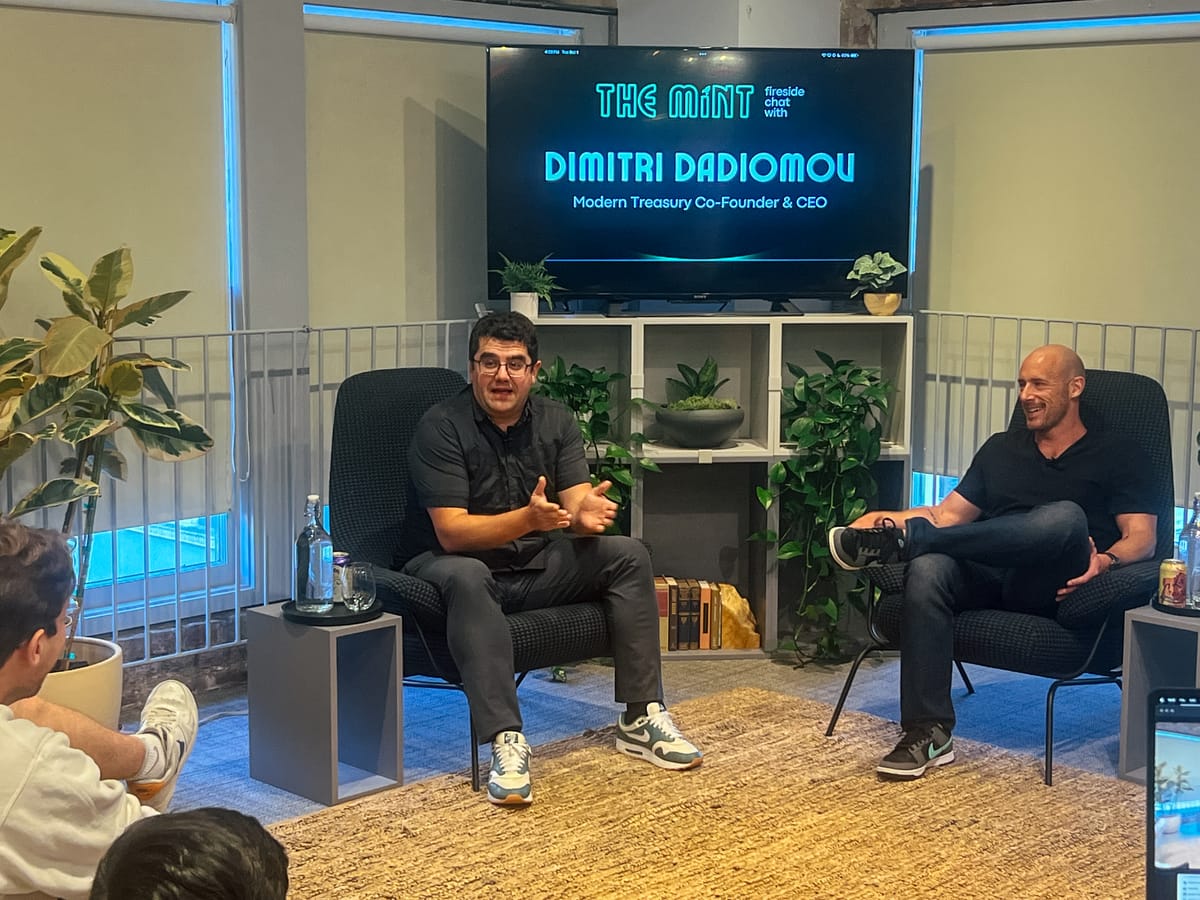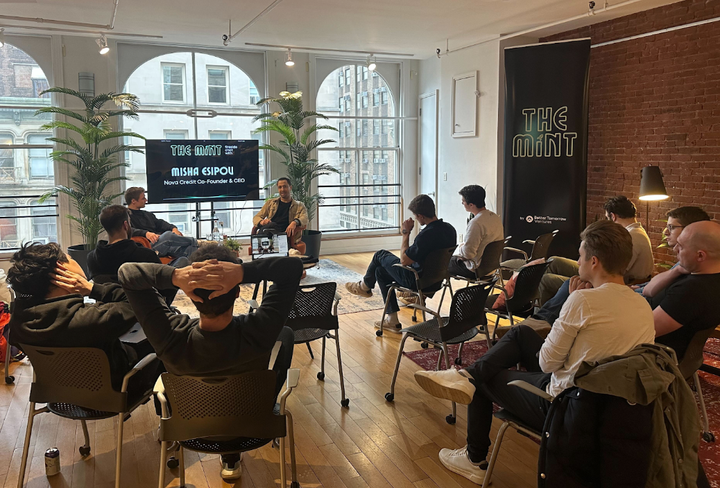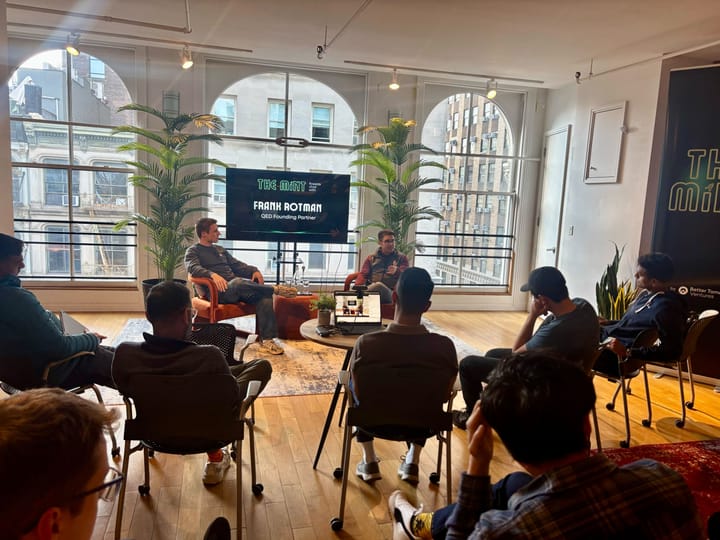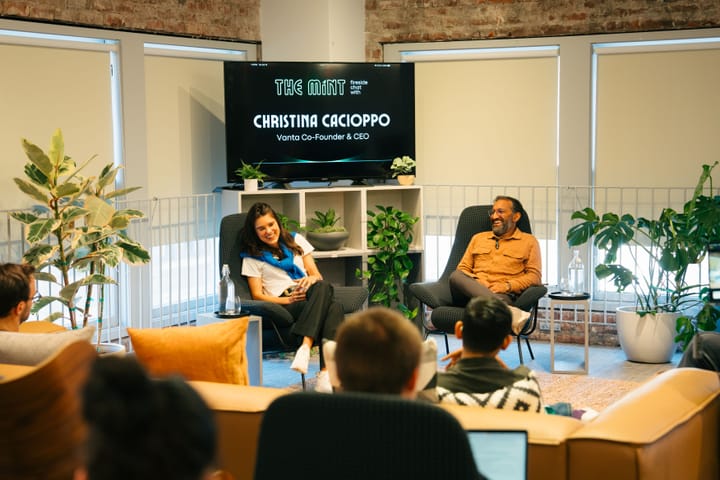The Mint Recap: Fireside Chat with Dimitri Dadiomov of Modern Treasury

We had the pleasure of hosting Dimitri Dadiomov, Co-Founder of Modern Treasury, as a special guest at The Mint.
Dimitri describes himself as having “rage founded” Modern Treasury. After encountering a problem while working at LendingHome and becoming frustrated by the lack of available solutions, he and his co founders started Modern Treasury to solve that problem, and to make it easier to move money with efficient tracking. Clients now move, track, and reconcile over $100B in payments a year using Modern Treasury, including over $1B in instant payments.
Dimitri shared valuable insights about founding and growing Modern Treasury. Here are some key takeaways:
- You learn faster when you’re small.
- Just make decisions.
- Stay flexible with pricing in the early days.
- Don’t over-index on profitability too early.
- Find creative ways to drive top-of-funnel reach.
More below! Also, Modern Treasury just published their Fall Release, check it out 👀
1. You learn faster when you’re small.
In the early stages, founders need to lead everything — including sales, product development, and customer interactions.
Dimitri mentioned that in the early days, founders have the “privilege” of doing everything themselves. This founder-led approach tightens feedback loops, allowing for quicker learning and iteration.
While it may be tempting to hire specialists, especially with available capital, each additional layer distances you from direct customer feedback. Keeping things founder-led helps you stay close to customers and their needs.
2. Just make decisions.
Dimitri emphasized the importance of making decisive calls and avoiding analysis paralysis.
You often have to make decisions without clear answers, especially when it comes to resource allocation and prioritizing products or features.
While you should be spending a lot of time listening to customers, at some point, the founder just has to make a call. Whether it’s launching new products, adding new features, or jumping to the next grander vision, even if customer feedback doesn't point you directly there, you have to keep moving forward.
Like Ford said, “If I had asked people what they wanted, they would have said faster horses."
3. Stay flexible with pricing in the early days.
There’s a balance between charging customers enough that they have “skin in the game” and not charging so much that it stifles growth. Early learning from your first customers is far more valuable than a few thousand dollars.
Dimitri noted that while your first customer shouldn’t generate significant revenue, your 10th or 100th should. You can’t afford to be learning what to build and ironing out kinks with a high-paying customer.
4. Don’t over-index on profitability too early.
Dimitri mentioned that early-stage founders shouldn’t focus too much on cash flow positivity and profitability. While understanding unit economics is important, it shouldn’t be the primary goal in the early stages.
You're building for the long-term; don't focus too much on pricing and revenue today. Focus on learning how to make your customers happy, and everything else will follow.
For companies aiming for venture-scale growth, the main objective should be to serve customers and build something substantial, even if it means not being profitable for a while.
5. Find creative ways to drive top-of-funnel reach.
Dimitri shared how content marketing added immense value for Modern Treasury. Early on, they focused on creating content that answered mechanical questions about money movement — a topic with little existing information on the web.
This approach generated inbound interest and established credibility. Their content marketing was so successful that they didn’t hire a salesperson for the first 2 years, relying instead on inbound interest from their content.
Fun fact: one of their most popular blog posts was about what happens when you ACH a payment to a deceased person! If you’re curious, check it out!



